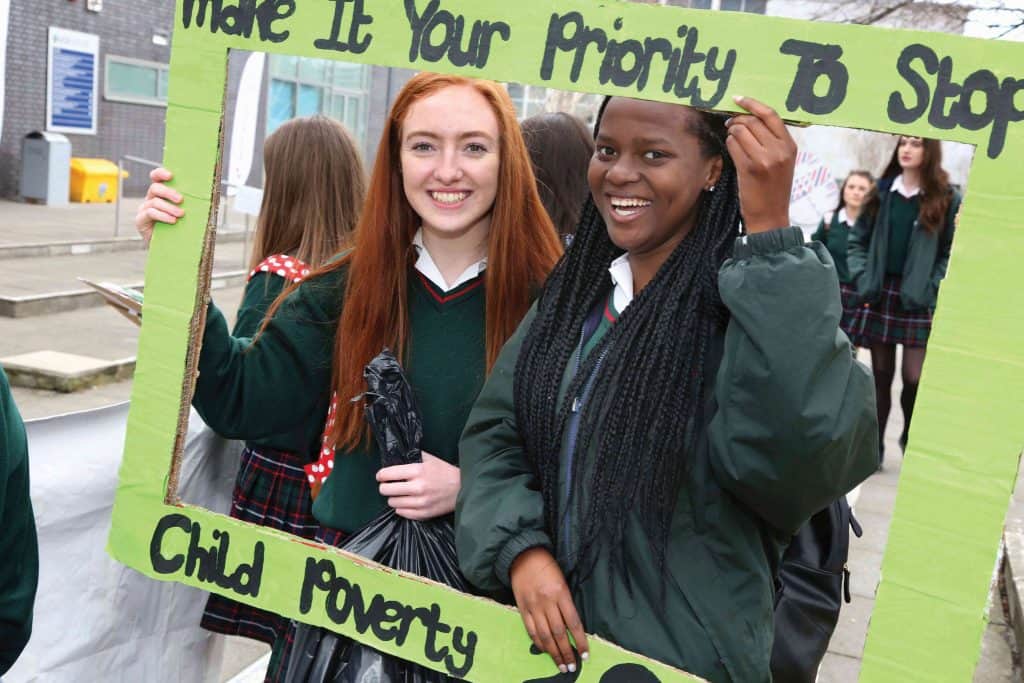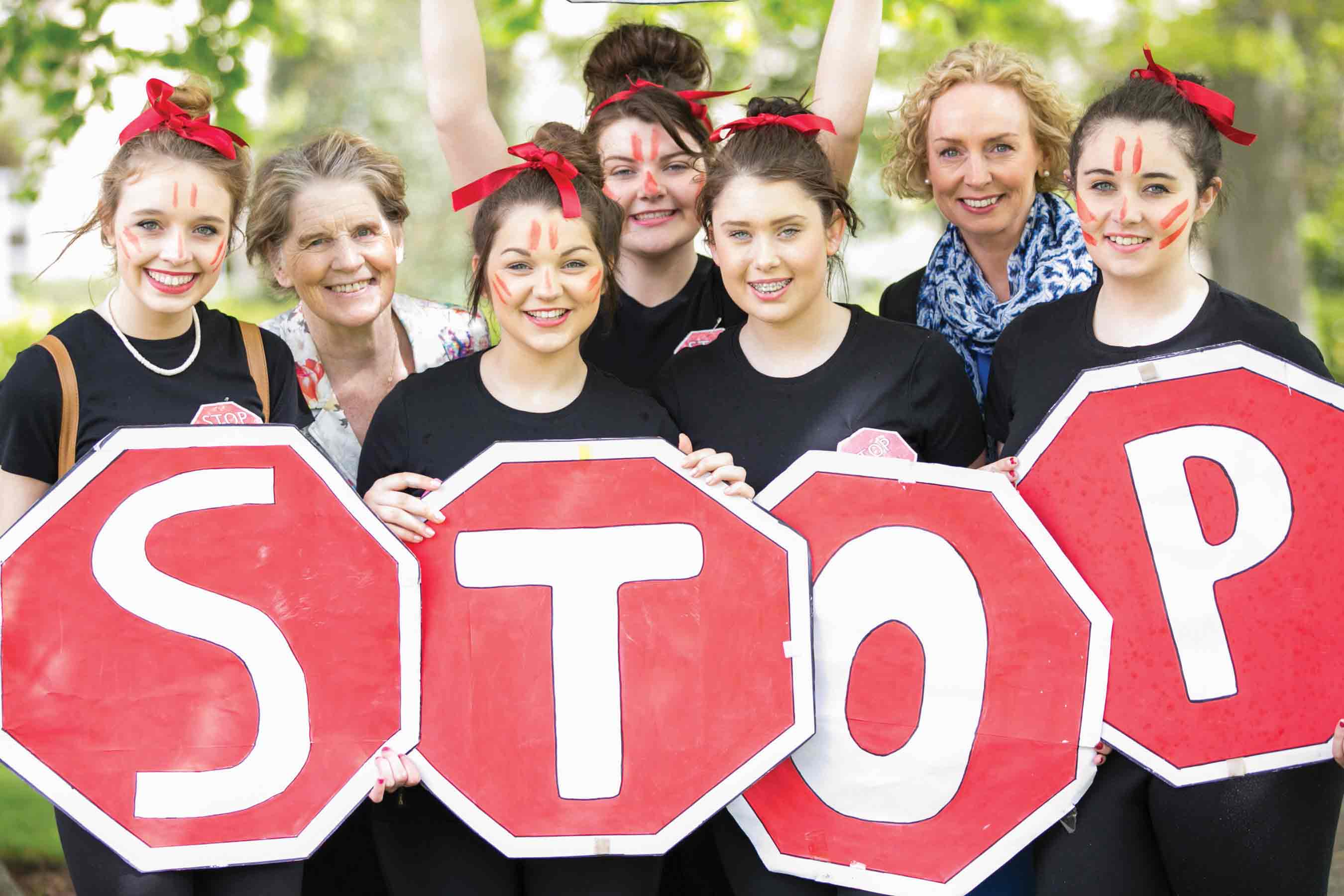Co-founder and Chief Executive of Young Social Innovators, Rachel Collier, on the programme which is encouraging a new socially-conscious generation.

Rachel Collier
Rachel Collier co-founded Young Social Innovators (YSI) with Sr Stan, as the renowned social justice campaigner is affectionately known, in 2001. The organisation was born out of a vision to give young people an opportunity to become active, engaged citzens. With the assistance of a network of hundreds of teachers and volunteers the organisation now puts thousands of young people through the YSI programme every year, encouraging them and assisting them to develop projects which improve their communities. YSI are building the first Social Innovation Learning Lab in Ireland, situated in DCU’s Alpha Innovation Centre and it will provide new opportunities for educators, students and business partners.
What are your main priorities and goals in your role?
Young Social Innovators’ vision is to fire young people’s passion to change the world for good and we do that through promoting and engaging teenagers and educators in social innovation education. We define social innovation simply as using your creativity to develop solutions which improve the well-being of people and society.
As CEO, my priority is to work with the right people, in the right way to make this vision a reality. We engage 14,000 teenagers every year in social innovation, which is quite amazing considering when we began in 2001 we engaged just 100. We have really grown. By 2020 we aim to be in 50% of second level schools, offering social innovation learning to the teenagers of Ireland.
YSI is a good example of a public and private partnership with both playing a role in building an infrastructure for social innovation in Ireland. Social innovation education is a pivotal component of that infrastructure. A top priority for me always is designing new ways and means for engaging young people and educators in social innovation and by so doing, develop innovative and entrepreneurial skills, necessary to build a better economy and society.
While we are a small team, we have a huge reach into Irish education at second level and literally thousands of people are involved in our programmes. An on-going priority for me is working alongside our key stakeholders, as well as forming new dynamic and strategic alliances within the education, youth, business and public sectors. This will help sustain and scale social innovation education in Ireland.
My belief is that everyone has a part to play in supporting young innovators. It takes a village to raise a child and, likewise, to develop a young innovator! So another major priority for me is amplifying the value of social innovation education to the wider world so we can engage those villages!
What are your biggest challenges as a CEO?
By 2020 we want 50% of teenagers to be able to do this through our programmes. That’s the challenge! And to do that, we need investment to build these opportunities. Our company is in the not-for-profit sector and sourcing core funding each year is a constant challenge. This keeps us focused but can impede scaling.
Social innovation education is not under the remit of a single government function or body. While the learning outcomes and skills (critical thinking, creativity, leadership, problem-solving, team work, resilience) which YSI helps to develop in our teenagers and our capacity to build much needed social capital is highly acclaimed, the infrastructure behind all this needs significantly more investment. We need a pipeline for social innovation that includes social innovation education. There is no doubt it adds value to the innovators, the economy, the community and society.
Idea generation and creative thinking is very much respected and encouraged and part of our culture
How do you keep your team motivated?
The YSI team is extremely motivated. I think it’s because we practice what we preach. We integrate innovative methods into our planning and work. Idea generation and creative thinking is very much respected and encouraged and part of our culture; this is complemented by excellent planning and implementation. We are a learning organisation so we embrace and build on both our successes and our mistakes. Most of all, our vision motivates us – all members of staff are inspired by the teenagers and educators we work with each year and by seeing the impact of youth-led social innovation on Irish society and further afield. There is no shortage of motivation and passion in our team.
What are the challenges facing your industry going forward
We are in the education industry, so to speak. Education and youth sectors have suffered major cuts in the crash and it will take time and the allocation of resources to recover.
Another challenge for us is that we are, as a society, not great at giving young people a voice, listening to their insights, experiences and ideas. To connect and make positive contributions to communities and society, they need to be heard.
There are many challenges in the not-for-profit sector. Financial security is always a challenge and this can hinder planning, development and sustainability.
What new trends are emerging in your industry?
There is more awareness about social innovation and entrepreneurship today than ever before, which is positive. We see innovations that contribute huge social value in Ireland – be these products, campaigns, enterprises, education, scientific, technical, designs, new ways of working – which emerge and change our very thinking and how we do things. We also see the opposite – how innovation can hinder humanity, social cohesion, climate change, and the very planet.
Recognising and questioning our innovations can help advance and enhance humanity so that innovation serves the creation of a fairer, more inclusive and sustainable world. More and more young people are insisting on responsible business, workplaces and developments. And watch out, because of YSI there will be more of these young people coming our way!

How is YSI helping to engage young people with STEM subjects?
We hear lots of talk about the need to build innovative, entrepreneurial and STEM skills amongst our youth. This is something that YSI does very effectively and we know about the most effective approaches to achieve this.
There is an identified need to engage more females in STEM careers. By engaging with a female to male ratio of 3:1 in YSI programmes, I believe that we have seen how our social innovation programmes can effectively engage female students in STEM in new and meaningful ways. As observed in Accenture report on Girls in STEM (2016): “Societal benefits are a key motivator for girls to follow STEM studies and, subsequently, careers. Industry needs to use this knowledge when crafting messages that target and encourage girls into those disciplines.’’ I believe that the social and community purpose of our social innovation programmes is the hook that attracts girls to using STEM in innovative ways.
Societal benefits are a key motivator for girls to follow STEM studies and, subsequently, careers. Industry needs to use this knowledge when crafting messages that target and encourage girls
Relevance for the student is an important driver of learning today. Innovation, creativity and the humanities can and should work to enhance STEM and so I like to add the Arts to the mix, using the increasingly popular acronym ‘STEAM’. Social innovation gives students a real purpose and focus for the use of STEM and/or the Arts. The purpose and human challenge which students explore through social innovation drives the use of STEAM. Entrepreneurial and innovative mindsets derive from such active and applied learning.
How did your strategy develop in the context of the banking crisis and economic crisis?
At the beginning of the crisis we were largely State funded. As a not-for-profit our funding was negatively affected by the downturn and in response, we reconfigured our offerings to teachers and students in light of more limited resources. We successfully managed to reduce our costs while simultaneously increasing our reach and impact during this time. Included in this was a change in our events format which ended up being less costly but superior in design.
We rebalanced our income from almost exclusively State funding to what is now a more balanced public/private funding model. This was made possible by creating a tremendous sponsorship opportunity though a new Official Partnership which was driven in the first instance by Vodafone in those years, followed by Ulster Bank, our current Official Awards Partner. These companies, at a difficult time, understood and invested in social innovation education.
We are now seeking a new Official Awards Partner and hope to have one in place by the summer. For any company interested in investing in social innovation and its potential impact on the world, please do contact me.
What’s the best advice you’ve been given, or would give, in business?
Maximise the creativity within your team; always look at the human impact of your work; never compromise quality delivery to any of your stakeholders. Whatever you do then, it should add value. And, of course, there is the simple necessity of keeping a close eye on cash flow!
I have worked with Sr Stan for over 30 years helping to develop new types of responses to human need. One of her mantras is that people often don’t see a problem until they see the solution. Whatever business you are in I think this is true, because we tend to be more comfortable doing what we know. We need an innovative mindset built into the culture of our businesses in order to stay relevant and add value.
The Young Social Innovators of the Year Awards Ireland 2018 will take place in Croke Park on May 8, when 30 teams from schools all over the country will present their social innovation projects and compete for the title of Young Social Innovators of the Year Ireland 2018.
This interview article was featured in our Q1 Review 2018 magazine. Subscribe to Business & Finance to get full access to our archive.






